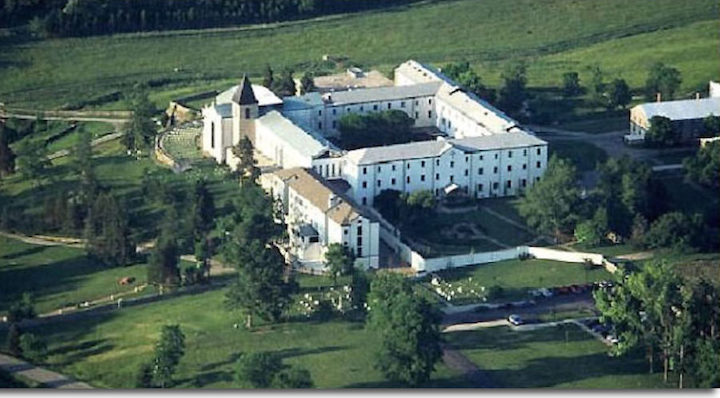I came to Our Lady of Gethsemani Trappist Abbey one cloudy winter morning when I was twenty-six. I drove down from a seminary in Cincinnati along roads made slick from the previous night’s ice storm. Power lines sagged under the weight of icicles. Tree limbs were bowed but glistening.
As I turned onto Kentucky 247 a few miles south of Bardstown my hands gripped the wheel so tightly my knuckles were white, especially when I saw a yellow caution sign warning that the curving road ahead was about to dip. I worried that the tires on my old Nash Rambler might not have the traction necessary to climb the hill up after the hill down, but the rise was gentle, and as I made the east-west curve and came onto the last flat straightaway, I saw the monastery tower and saw that there was a patch of blue sky above the abbey and saw the border of gray clouds around the blue, rimmed in fiery gold. Sunlight streamed down in ribbons on the monastery, and I was frightened that I was witnessing a message from God; that this retreat was meant to be the beginning for me of a vocation to monasticism. I almost turned the car around.
It was a momentous stay for me – as I recall it was a Monday to Friday retreat – because I came to realize I was not cut out to be a monk, however much I admired the monastic life and might try to emulate it in my worldly existence. I did not mind rising at three in the morning and collapsing into bed at eight in the evening, and, though as a visitor one does not participate in the work of the house, I would not have minded the farming I saw the monks doing – I’d spent summers in high school working on a farm. And I did not mind the silence, which in any case is not particularly burdensome for a visitor. What I minded was the absence . . . of women, and if you miss the girls you know you are not made for monkhood. I shared my thoughts with the guestmaster and told him about the omen of sunlight that had greeted my arrival. Was I missing God’s call? The monk looked at me for a moment and then, barely suppressing a chuckle, he asked:
“You mean to say you think God arranges the weather for you?”
Then we both had a good laugh.
Anyone who takes himself too seriously always runs the risk of looking ridiculous, anyone who can consistently laugh at himself does not. So wrote Václav Havel in Disturbing the Peace.

I hadn’t expected to realize so quickly that I wasn’t cut out for the monastic life (or the priesthood) and in the years following often wondered if I’d missed something essential on my visit. I didn’t marry for another decade, and until I did, I’d wonder if I’d overestimated my passion for domesticity – this despite considerable evidence to the contrary. I’d tell friends the story of my retreat: the ride down, the portentous sunlight, the day-long process of prayer, the hiking in the woods, the hours in the library studying the Rule of St. Benedict.
“Tell me about that rule,” a friend said once. “You were reading it then and there. Did the Trappists seem to be following it?”
I said I thought they surely were, and my pal wondered what that meant.
“Ne quid nimis,” I replied.
“Which means what?” he asked.
Nothing to excess.
He was flabbergasted. He demanded to know how cloistered men praying incessantly and living in silence and solitude can be considered anything but excessive. I replied that the monks seem to float along on a cushion of equable poise. They were unflappable.
“Stoic?” he asked.
That and more.
They were capable, when they did speak, of speaking directly, simply, and without sermonizing. They possess the compassion you expect but also a detachment that takes you by surprise. That’s the stillness that on first encounter seems downright eerie. I tended to glamorize it, imagining that the monks really were floating by, feet off the ground, carried along by angels. But they were just going here and there and they knew exactly where, and, in fact, they were always already there. The guestmaster spoke to me plainly, and his words were wonderful because they were created only for me. He gave me his precious time, and in the minutes we shared he was able to see me with a heart and a soul and a mind uncluttered by the bumptious intrusions of television and movies, car payments and mortgages, women and children, war and peace.
If your retreat into monasticism works, it works because you share a week, a day, an hour smack on the edge of eternity.














